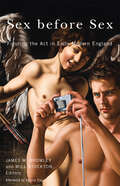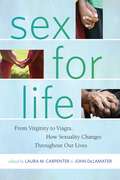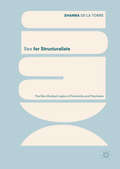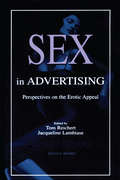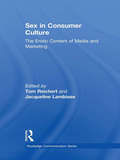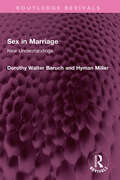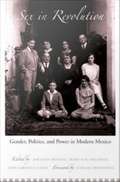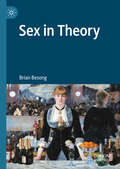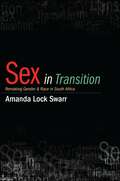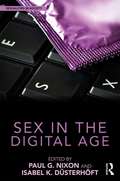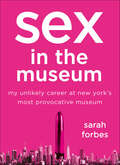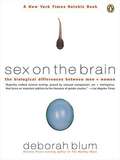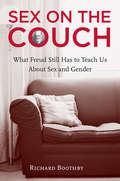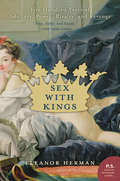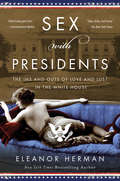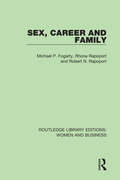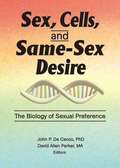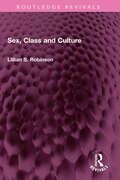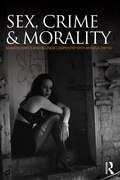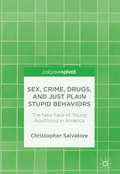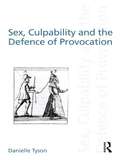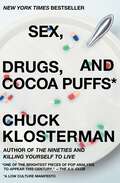- Table View
- List View
Sex before Sex: Figuring the Act in Early Modern England
by James M. Bromley Will StocktonWhat is sex exactly? Does everyone agree on a definition? And does that definition hold when considering literary production in other times and places? Sex before Sex makes clear that we cannot simply transfer our contemporary notions of what constitutes a sex act into the past and expect them to be true for the people who were then reading literature and watching plays. The contributors confront how our current critical assumptions about definitions of sex restrict our understanding of representations of sexuality in early modern England. Drawing attention to overlooked forms of sexual activity in early modern culture, from anilingus and interspecies sex to &“chin-chucking&” and convivial drinking, Sex before Sex offers a multifaceted view of what sex looked like before the term entered history. Through incisive interpretations of a wide range of literary texts, including Romeo and Juliet, The Comedy of Errors, Paradise Lost, the figure of Lucretia, and pornographic poetry, this collection queries what might constitute sex in the absence of a widely accepted definition and how a historicized concept of sex affects the kinds of arguments that can be made about early modern sexualities.Contributors: Holly Dugan, George Washington U; Will Fisher, CUNY–Lehman College; Stephen Guy-Bray, U of British Columbia; Melissa J. Jones, Eastern Michigan U; Thomas H. Luxon, Dartmouth College; Nicholas F. Radel, Furman U; Kathryn Schwarz, Vanderbilt U; Christine Varnado, U of Buffalo–SUNY.
Sex for Life: From Virginity to Viagra, How Sexuality Changes Throughout Our Lives (Intersections #10)
by John DeLamater Laura M. CarpenterSexual beliefs, behaviors and identities are interwoven throughout our lives, from childhood to old age. An edited collection of original empirical contributions united through its use of a distinctive, cutting-edge theoretical framework, Sex for Life critically examines sexuality across the entire lifespan. Rooted in diverse disciplines and employing a wide range of research methods, the chapters explore the sexual and social transitions that typically map to broad life stages, as well as key age-graded physiological transitions, such as puberty and menopause, while drawing on the latest developments in gender, sexuality, and life course studies.Sex for Life explores a wide variety of topics, including puberty, sexual initiation, coming out, sexual assault, marriage/life partnering, disability onset, immigration, divorce, menopause, and widowhood, always attending to the social locations – including gender, race, ethnicity, and social class – that shape, and are shaped by, sexuality. The empirical work collected in Sex for Life ultimately speaks to important public policy issues, such as sex education, aging societies, and the increasing politicization of scientific research. Accessibly written, the contributions capture the interplay between individual lives and the ever-changing social-historical context, facilitating new insight not only into people’s sexual lives, but also into ways of studying them, ultimately providing a fresh, new perspective on sexuality.
Sex for Structuralists: The Non-Oedipal Logics of Femininity and Psychosis
by Shanna de la TorreThis book argues that structuralism makes itself useful when it engages with the non-Oedipal logics of femininity and psychosis. Building from the psychoanalytic belief that norms repress unconscious desire while structures open onto the creative resources of the symbolic, Sex for Structuralists looks to key texts in myth, trauma, and unconscious fantasy by Sigmund Freud, Jacques Lacan, and Claude Lévi-Strauss. It also examines innovative writings by contemporary Lacanian thinkers in order to discover what becomes of structuralism when the ground upon which it ostensibly stands (namely, that of the zero symbol or the incest prohibition) drops out from under it.
Sex in Advertising: Perspectives on the Erotic Appeal (Routledge Communication Series)
by Tom Reichert Jacqueline LambiaseSex in Advertising: Perspectives on the Erotic Appeal is the first book to thoroughly tackle important issues about sex in advertising. What is it? Does it work? How does it affect individuals and society? Well-respected scholars and popular writers answer these questions as they address the following issues associated with sex in today's advertising environment: gender differences and representation, unintended social effects, subliminal embeds, appeals to the homosexual community, and new media. The book contains a blend of perspectives, including original experimental studies, interpretive and historical analyses, and cultural critiques. The definitive source on sex in advertising, this book: *is centralized around a singular theme: Understanding how sex in advertising appeals work and why they are so prevalent; *includes multiple perspectives to capture the richness of sexual appeals; *brings together viewpoints from both well-known scholars and writers; *provides a wealth of ideas and research questions for those interested in the topic; and *contains discussions of sex in advertising from its roots in the 1700s to online advertising today and beyond. The book is must reading for advertising and gender researchers, scholars, and students. Anyone interested in mass media, consumer psychology, and popular culture will find this book an essential resource.
Sex in Consumer Culture: The Erotic Content of Media and Marketing (Routledge Communication Series)
by Tom Reichert Jacqueline LambiaseSex in Consumer Culture: The Erotic Content of Media and Marketing considers the use of sex to promote brands, magazines, video games, TV programming, music, and movies. Offering both quantitative and qualitative perspectives from leading scholars in a variety of disciplines, this volume addresses a range of integral issues such as media promotion, racial representations, appeals to gay and lesbian communities, content analyses, and case studies. Chapters represent diverse perspectives, addressing such questions as:*What happens when sexual content created for adults reaches children?*What meaning do sexual words and images have within the contexts of sporting events, trade shows, video games, personal ads, or consumer Web sites?*What effects might sex-tinged images have on audiences, and where should the focus be for new effects research?*Where are the current boundaries between pornography and mainstream sexual depictions?Exploring sexual information as it is used in mass media to sell products and programs, Sex in Consumer Culture is an important collection, and it will be of great interest for scholars and students in advertising, marketing, media promotion, persuasion, mass communication & society, and gender studies.
Sex in Marriage: New Understandings (Routledge Revivals)
by Dorothy Walter Baruch Hyman MillerFirst Published in 1963, Sex in Marriage presents down to earth, practical guidance on the emotional and physical aspects of life, love and marriage. The authors both experienced psychotherapists, have felt that a new approach was needed. The book explains in a straightforward and thorough manner the sources of satisfaction and the roots of discontent that lie beneath the surface of any marriage. It traces marriage from the beginning, through its middle years and into its older stages, including considerations that are concrete and practical but still have a fundamental and sound emotional base. The book illustrates how attitudes in sex and marriage go back to childhood and how early experiences, though forgotten, can still exercise important influences. In helping to alleviate old guilts and anxieties, the book makes an essential contribution. This is an interesting read for sociologists, psychologists and for general readers.
Sex in Peace Operations
by Gabrielle SimmGabrielle Simm's critical re-evaluation of sex between international personnel and local people examines the zero-tolerance policy on sexual exploitation and abuse and its international legal framework. Whereas most preceding studies of the issue have focused exclusively on military peacekeepers, Sex in Peace Operations also covers the private military contractors and humanitarian NGO workers who play increasingly important roles in peace operations. Informed by socio-legal studies, Simm uses three case studies (Bosnia, West Africa and the Democratic Republic of the Congo) to illustrate the extent of the problem and demonstrate that the problems of impunity for sexual crimes are not just a failure of political will but the result of the structural weaknesses of international law in addressing non-state actors. Combining the insights of feminist critique with a regulatory approach to international law, her conclusions will interest scholars of international law, peace and conflict studies, gender and sexuality, and development.
Sex in Revolution: Gender, Politics, and Power in Modern Mexicoa
by Jocelyn Olcott Mary Kay Vaughan Gabriela CanoSex in Revolution challenges the prevailing narratives of the Mexican Revolution and postrevolutionary state formation by placing women at center stage. Bringing to bear decades of feminist scholarship and cultural approaches to Mexican history, the essays in this book demonstrate how women seized opportunities created by modernization efforts and revolutionary upheaval to challenge conventions of sexuality, work, family life, religious practices, and civil rights. Concentrating on episodes and phenomena that occurred between 1915 and 1950, the contributors deftly render experiences ranging from those of a transgendered Zapatista soldier to upright damas catlicas and Mexico City's chicas modernas pilloried by the press and male students. Women refashioned their lives by seeking relief from bad marriages through divorce courts and preparing for new employment opportunities through vocational education. Activists ranging from Catholics to Communists mobilized for political and social rights. Although forced to compromise in the face of fierce opposition, these women made an indelible imprint on postrevolutionary society. These essays illuminate emerging practices of femininity and masculinity, stressing the formation of subjectivity through civil-society mobilizations, spectatorship and entertainment, and locales such as workplaces, schools, churches, and homes. The volume's epilogue examines how second-wave feminism catalyzed this revolutionary legacy, sparking widespread, more radically egalitarian rural women's organizing in the wake of late-twentieth-century democratization campaigns. The conclusion considers the Mexican experience alongside those of other postrevolutionary societies, offering a critical comparative perspective. Contributors. Ann S. Blum, Kristina A. Boylan, Gabriela Cano, Mara Teresa Fernndez Aceves, Heather Fowler-Salamini, Susan Gauss, Temma Kaplan, Carlos Monsivis, Jocelyn Olcott, Anne Rubenstein, Patience Schell, Stephanie Smith, Lynn Stephen, Julia Tun, Mary Kay Vaughan
Sex in Theory
by Brian BesongThis volume explores the major moral theories and their distinctive approaches and controversial implications regarding sex. Despite being a commonplace human activity, contemporary discussions of the norms regarding sex—particularly those that connect with the major moral theories—are relatively rare. This volume shows that the relative silence is important, for all the major moral theories appear to have controversial implications about the morality and value of sex. Consequently, either widespread Western assumptions about sex are mistaken or else the major moral theories have serious problems when it comes to the ethics of the bedroom. Adopting a metaethical Mooreanism about our sexual intuitions offers a potential compromise, such that some of the more novel and controversial Western intuitions are abandoned with resulting room for at least one moral theory to remain viable.
Sex in Transition: Remaking Gender and Race in South Africa
by Amanda Lock SwarrHonorable Mention, 2013 Ruth Benedict Book Prize presented by the Association for Queer AnthropologyHonorable Mention, 2014 Distinguished Book Award presented by the Section on Sexualities of the American Sociological AssociationWinner of the 2013 Sylvia Rivera Award in Transgender Studies presented by the Center for Gay and Lesbian StudiesSex in Transition explores the lives of those who undermine the man/woman binary, exposing the gendered contradictions of apartheid and the transition to democracy in South Africa. In this context, gender liminality—a way to describe spaces between common conceptions of "man" and "woman"—is expressed by South Africans who identify as transgender, transsexual, transvestite, intersex, lesbian, gay, and/or eschew these categories altogether. This book is the first academic exploration of challenges to the man/woman binary on the African continent and brings together gender, queer, and postcolonial studies to question the stability of sex. It examines issues including why transsexuals' sex transitions were encouraged under apartheid and illegal during the political transition to democracy and how butch lesbians and drag queens in urban townships reshape race and gender. Sex in Transition challenges the dominance of theoretical frameworks based in the global North, drawing on fifteen years of research in South Africa to define the parameters of a new transnational transgender and sexuality studies.
Sex in the Digital Age (Sexualities in Society)
by Paul G Nixon Isabel K. DüsterhöftShifts in societal development resulting from economic and technological advancements have had an impact upon the development of human sexuality and behaviour, and with the expansion of developments such as the Internet and associated technologies, it is likely that further societal shifts will ensue. This book recognises the importance of new digital spaces for discourses surrounding sexuality, examining issues such as pornography; sex education and health; LGBTQ sexualities; polysexuality or polyamory; abstention; sexual abuse and violence; erotic online literature; sex therapy; teledildonics; sex and gaming; online dating; celebrity porn; young people and sexual media; and sexting and sextainment, all of which are prominently affected by the use of digital media. With case studies drawn from the US, the UK and Europe, Sex in the Digital Age engages in discussion about the changing acceptance of sex in the 21st century and part played in that by digital media, and considers the future of sex and sexuality in an increasingly digital age. It will therefore appear to scholars across the social sciences with interests in gender and sexuality, new technologies and media and cultural studies.
Sex in the Heartland
by Beth BaileySex in the Heartland is the story of the sexual revolution in a small university town in the quintessential heartland state of Kansas. Bypassing the oft-told tales of radicals and revolutionaries on either coast, Beth Bailey argues that the revolution was forged in towns and cities alike, as "ordinary" people struggled over the boundaries of public and private sexual behavior in postwar America. Bailey fundamentally challenges contemporary perceptions of the revolution as simply a triumph of free love and gay lib. Rather, she explores the long-term and mainstream changes in American society, beginning in the economic and social dislocations of World War II and the explosion of mass media and communication, which aided and abetted the sexual upheaval of the 1960s. Focusing on Lawrence, Kansas, we discover the intricacies and depth of a transformation that was nurtured at the grass roots. Americans used the concept of revolution to make sense of social and sexual changes as they lived through them. Everything from the birth control pill and counterculture to Civil Rights, was conflated into "the revolution," an accessible but deceptive simplification, too easy to both glorify and vilify. Bailey untangles the radically different origins, intentions, and outcomes of these events to help us understand their roles and meanings for sex in contemporary America. She argues that the sexual revolution challenged and partially overturned a system of sexual controls based on oppression, inequality, and exploitation, and created new models of sex and gender relations that have shaped our society in powerful and positive ways.
Sex in the Museum: My Unlikely Career at New York's Most Provocative Museum
by Sarah ForbesSarah Forbes was in graduate school when she stumbled upon a museum dedicated to . . . sex. The anthropology student hesitated when her boyfriend suggested she apply for a job, but apply she did, and it wasn’t long before a part-time position at New York’s MUSEUM OF SEX lead to a gig as the museum's curator. That was over twelve years ago. Now Sarah—a married mother of two—proudly sports her title as Curator of Sex. In SEX IN THE MUSEUM, Sarah invites readers to travel from suburban garages where men and women build sex machines, to factories that make sex toys, to labyrinthine archives of erotica collectors. Escorting us in to the hidden world of sex, illuminating the never-talked-about communities and eccentricities of our sexual subcultures, and telling her own personal story of a decade at The Museum of Sex, Sarah asks readers to grapple with the same questions she did: when it comes to sex, what is good, bad, deviant, normal? Do such terms even apply? If everyone has sexual secrets, is it possible to really know another person and be known by them? And importantly, in our hyper-sexualized world, is it still possible to fall in love?
Sex on the Brain
by Deborah BlumGo beyond the headlines and the hype to get the newest findings in the burgeoning field of gender studies. Drawing on disciplines that include evolutionary science, anthropology, animal behavior, neuroscience, psychology, and endocrinology, Deborah Blum explores matters ranging from the link between immunology and sex to male/female gossip styles. The results are intriguing, startling, and often very amusing. For instance, did you know that. . . ? Male testosterone levels drop in happy marriages; scientists speculate that women may use monogamy to control male behavior? Young female children who are in day-care are apt to be more secure than those kept at home; young male children less so? Anthropologists classify Western societies as "mildly polygamous" The Los Angeles Times has called Sex on the Brain "superbly crafted science writing, graced by unusual compassion, wit, and intelligence, that forms an important addition to the literature of gender studies. " .
Sex on the Couch: What Freud Still Has To Teach Us About Sex and Gender
by Richard BoothbyFirst published in 2006. Routledge is an imprint of Taylor & Francis, an informa company.
Sex und Moral – passt das zusammen? (#philosophieorientiert)
by Hilkje Charlotte HänelSex. Die meisten von uns haben ihn. Mal schlecht, mal gut, manchmal phänomenal. Die wenigsten denken lange drüber nach. Oder reden offen drüber. Dabei ist gar nicht so klar, was Sex eigentlich gut macht. Befriedigung? Spaß? Gemeinsamkeit? Interesse an emotionaler Bindung und Stabilität? Reproduktion? Und wann ist Sex schlecht? Oder nicht nur schlecht, sondern sogar moralisch problematisch? Hilkje Hänel zeigt, dass es gar nicht so einfach ist, zwischen problematischem Sex (weil z.B. erzwungen oder ohne Zustimmung) und gutem Sex klar zu unterscheiden. Denn viele sexuelle Handlungen, die wir vornehmen, sind zwar nicht gut, aber auch nicht moralisch problematisch. Manchmal sind wir vielleicht nicht ganz bei der Sache oder würden eigentlich gerade lieber etwas anderes machen. Manchmal müssen wir uns gegenseitig oder sogar uns selbst noch besser kennenlernen. Hänel zufolge gibt es eine große Grauzone zwischen gutem, schlechtem und moralisch problematischem Sex, wobei es häufig vor allem auf den Kontext und unsere Kommunikation ankommt. Auf der Basis aktueller Wissenschaft und medialer Bewegungen wie #MeToo verteidigt Hänel ihre Ansichten gegen die wichtigsten Einwände und argumentiert für mehr Respekt im Bett. „Hilkje Hänel ist eine echte Aufklärungsphilosophin. Sachlich, scharfsinnig und mit einem klaren Sinn dafür, dass die richtigen Worte zu größerer Freiheit führen können.“ (Eva von Redecker, Schriftstellerin und Marie-Skłodoska-Curie Wissenschaftlerin mit einem Projekt zu Authoritarian Personality an der Universität Verona, Italien) "Hilkje Hänel behandelt ein überfälliges Thema und führt die Leser in diesem Band eingängig und mit argumentativem Scharfsinn durch das Terrain zwischen Sex und Moral. Die Lektüre ist ein Vergnügen und regt an, über ein Gebiet nachzudenken, das uns alle betrifft.“ (Monika Betzler, Professorin für Praktische Philosophie und Ethik an der Ludwig-Maximilians-Universität München)
Sex with Kings: 500 Years of Adultery, Power, Rivalry, and Revenge (P. S. Ser.)
by Eleanor HermanThroughout the centuries, royal mistresses have been worshiped, feared, envied, and reviled. They set the fashions, encouraged the arts, and, in some cases, ruled nations. Eleanor Herman's Sex with Kings takes us into the throne rooms and bedrooms of Europe's most powerful monarchs. Alive with flamboyant characters, outrageous humor, and stirring poignancy, this glittering tale of passion and politics chronicles five hundred years of scintillating women and the kings who loved them. Curiously, the main function of a royal mistress was not to provide the king with sex but with companionship. Forced to marry repulsive foreign princesses, kings sought solace with women of their own choice. And what women they were! From Madame de Pompadour, the famous mistress of Louis XV, who kept her position for nineteen years despite her frigidity, to modern-day Camilla Parker-Bowles, who usurped none other than the glamorous Diana, Princess of Wales. The successful royal mistress made herself irreplaceable. She was ready to converse gaily with him when she was tired, make love until all hours when she was ill, and cater to his every whim. Wearing a mask of beaming delight over any and all discomforts, she was never to be exhausted, complaining, or grief-stricken. True, financial rewards for services rendered were of royal proportions -- some royal mistresses earned up to $200 million in titles, pensions, jewels, and palaces. Some kings allowed their mistresses to exercise unlimited political power. But for all its grandeur, a royal court was a scorpion's nest of insatiable greed, unquenchable lust, and vicious ambition. Hundreds of beautiful women vied to unseat the royal mistress. Many would suffer the slings and arrows of negative public opinion, some met with tragic ends and were pensioned off to make room for younger women. But the royal mistress often had the last laugh, as she lived well and richly off the fruits of her "sins." From the dawn of time, power has been a mighty aphrodisiac. With diaries, personal letters, and diplomatic dispatches, Eleanor Herman's trailblazing research reveals the dynamics of sex and power, rivalry and revenge, at the most brilliant courts of Europe. Wickedly witty and endlessly entertaining, Sex with Kings is a chapter of women's history that has remained unwritten -- until now.
Sex with Presidents: The Ins and Outs of Love and Lust in the White House
by Eleanor HermanIn this fascinating work of popular history, the New York Times bestselling author of Sex with Kings and The Royal Art of Poison uncovers the bedroom secrets of American presidents and explores the surprising ways voters have reacted to their leaders’ sex scandals.While Americans have a reputation for being strait-laced, many of the nation’s leaders have been anything but puritanical. Alexander Hamilton had a steamy affair with a blackmailing prostitute. John F. Kennedy swam nude with female staff in the White House swimming pool. Is it possible the qualities needed to run for president—narcissism, a thirst for power, a desire for importance—go hand in hand with a tendency to sexual misdoing?In this entertaining and eye-opening book, Eleanor Herman revisits some of the sex scandals that have rocked the nation's capital and shocked the public, while asking the provocative questions: does rampant adultery show a lack of character or the stamina needed to run the country? Or perhaps both? While Americans have judged their leaders' affairs harshly compared to other nations, did they mostly just hate being lied to? And do they now clearly care more about issues other than a politician’s sex life?What is sex like with the most powerful man in the world? Is it better than with your average Joe? And when America finally elects a female president, will she, too, have sexual escapades in the Oval Office?
Sex, Career and Family (Routledge Library Editions: Women and Business #6)
by Rhona Rapoport Robert N. Rapoport Michael P. FogartyIn this book, first published in 1971, the authors show from first-hand studies of family and working life (and with evidence from many countries, including the socialist societies of Eastern Europe) the nature of the discrimination facing women in the professions – and how various family and employment patterns might contribute to solving it. Their point is not that some new stereotype should be substituted for traditional views of the role of husbands and wives: different patterns fit different situations.
Sex, Cells, and Same-Sex Desire: The Biology of Sexual Preference
by David A ParkerThis fascinating new book explores the myriad aspects of biological theories of sexual preference. Sex, Cells, and Same-Sex Desire describes, reviews, and questions recent biological research on sexual preference from the point of view of knowledgeable scientists and of scholars in the social sciences and humanities representing the emerging field of gay studies. The issues involved have a vibrant history, are wide-ranging, and remain the objects of much controversy. This book demystifies biological research on sexual preference and makes it accessible to readers unfamiliar with biological and medical research.Sex, Cells, and Same-Sex Desire is divided into several sections, each of which is introduced by an explanation of key concepts and terms found in that section. The book begins with a discussion of the history of biological theories and sociocultural concepts of gender and sexuality. The next 3 sections explore specialized areas of biological science and related issues: genetics and evaluation, hormones and the endocrine system, and brain physiology and structure. A final section discusses social stigma, science, and medicine. A glossary of terms used by the authors is included, so readers may look up those that may be unfamiliar.
Sex, Class and Culture (Routledge Revivals)
by Lillian RobinsonFirst published in 1986, Sex, Class and Culture is a collection of Marxist feminist essays that develops an original critical theory and applies it to literature, the visual arts, and mass media. Lillian Robinson was the first American critic to suggest the essential connections among sex, class, and race as forces that shape works of art and the critical response to them. In applying her theory to particular texts, she considers topics from the Renaissance epic to the Regency romance, from Jane Austen to contemporary feminist poets, and from factory workers’ memoirs to TV images of career women and housewives. The essays are insightful because Robinson clearly knows this wide assortment of texts, cares about their significance, and writes about them with wit. They are irreverent, because she asserts the feminist critic’s permanent responsibility to ask "So What?" and they are controversial because she constantly addresses that question to our most powerful and respectable institutions – social and literary. This book will be of interest to students of literature, history, gender studies and sexuality studies.
Sex, Crime and Morality
by Sharon Hayes Belinda Carpenter Angela DwyerOver the last few decades, there has been a marked increase in media and debate surrounding a specific group of offences in modern Democratic nations which bear the brunt of the label ‘crimes against morality’. Included within this group are offences related to prostitution and pornography, homosexuality and incest and child sexual abuse. This book examines the nexus between sex, crime and morality from a theoretical perspective. This is the first academic text to offer an examination and analysis of the philosophical underpinnings of sex-related crimes and social attitudes towards them and the historical, anthropological and moral reasons for differentiating these crimes in contemporary western culture. The book is divided into three sections corresponding to three theoretical frameworks: Part 1 examines the moral temporality of sex and taboo as a foundation for legislation governing sex crimes Part 2 focuses on the geography of sex and deviance, specifically notions of public morality and the public private divide Part 3 examines the moral economy of sex and harm, including the social construction of harm. Sex, Crime and Morality will be key reading for students of criminology, criminal justice, gender studies and ethics, and will also be of interest to justice professionals.
Sex, Crime, Drugs, and Just Plain Stupid Behaviors: The New Face of Young Adulthood in America
by Christopher SalvatoreSex, Crime, Drugs, and Just Plain Stupid Behaviors: The New Face of Young Adulthood in America is written for students, parents, and practitioners to provide insight into how emerging adulthood impacts the lives and behaviors of young people. Salvatore provides an insightful examination of the evolution of emerging adulthood as a distinct stage of the life course, bridging the gap between macro-level social forces and micro-level life experiences and behavior. Chapters discuss the influence of social institutions such as marriage, the family, religion, and parenting on behavior during emerging adulthood. Exploration and sensation-seeking are examined in relation to the behaviors and identity of emerging adults alongside issues such as criminal offending, substance use, and other risky/dangerous behaviors. Finally, the book concludes with informed policy recommendations for social institutions such as educational establishments and the criminal justice system on how to work with emerging adults.
Sex, Culpability and the Defence of Provocation
by Danielle TysonThe partial defence of provocation is one of the most controversial doctrines within the criminal law. It has now been abolished in a number of international jurisdictions. Addressing the trajectory of debates about reform of the provocation defence across different jurisdictions, Sex, Culpability and the Defence of Provocation considers the construction and representation of subjectivity and sexual difference in legal narrations of intimate partner homicide. Undeniably, the most vexing exculpatory cultural narrative of our times is that of a woman 'asking for it'. This book explores how the process of judgment in a criminal trial involves not only the drawing of inferences from the facts of a particular case, but also operates to deliver a narrative. Law, it is argued, constructs a narrative of how the female body incites male violence. And, pursuing an approach that is informed by socio-legal studies, literary theory and feminist theories of the body, Sex, Culpability and the Defence of Provocation considers how this narrative is constructed via a range of discursive practices that position woman as a threat to masculine norms of propriety and autonomy. Once we have a clear understanding of the significance of narrative in legal decision-making, we can then formulate textual strategies of resistance to the violence of law's victim-blaming narratives by rewriting them.
Sex, Drugs, and Cocoa Puffs: A Low Culture Manifesto (Chuck Klosterman On Media And Culture Ser.)
by Chuck KlostermanFrom the author of the highly acclaimed heavy metal memoir, Fargo Rock City, comes another hilarious and discerning take on massively popular culture--set in Chuck Klosterman's den and your own--covering everything from the effect of John Cusack flicks to the crucial role of breakfast cereal to the awesome power of the Dixie Chicks.Countless writers and artists have spoken for a generation, but no one has done it quite like Chuck Klosterman. With an exhaustive knowledge of popular culture and an almost effortless ability to spin brilliant prose out of unlikely subject matter, Klosterman attacks the entire spectrum of postmodern America: reality TV, Internet porn, Pamela Anderson, literary Jesus freaks, and the real difference between apples and oranges (of which there is none). And don't even get him started on his love life and the whole Harry-Met-Sally situation. Whether deconstructing Saved by the Bell episodes or the artistic legacy of Billy Joel, the symbolic importance of The Empire Strikes Back or the Celtics/Lakers rivalry, Chuck will make you think, he'll make you laugh, and he'll drive you insane--usually all at once. Sex, Drugs, and Cocoa Puffs is ostensibly about art, entertainment, infotainment, sports, politics, and kittens, but--really--it's about us. All of us. As Klosterman realizes late at night, in the moment before he falls asleep, "In and of itself, nothing really matters. What matters is that nothing is ever 'in and of itself.'" Read to believe.
